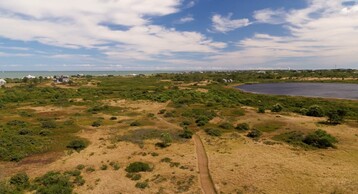Current Nature: Climate Change Awareness Month
Sarah Bois | Linda Loring Nature Foundation •

September is Climate Change Awareness Month on Nantucket. When we think of climate change on-island, many of us immediately think of erosion on the east and south coasts, flooding at certain roads, or too-hot summers. But there are other impacts to our island that are both directly and indirectly caused by our changing climate.
With climate change, we are seeing rising temperatures both in the air and water, changing snow and rainfall patterns, and more frequent extreme weather events. These are all impacts that we are currently experiencing. And while predicting future climate change impacts is imperative, it’s also important to document the changes we are seeing now. A collaborative effort between the Nantucket Conservation Foundation (NCF) and the Linda Loring Nature Foundation (LLNF) is working to collect observations and experiences from the community.
Led by Drs. Sarah Bois (LLNF) and Jen Karberg (NCF), the goal of the project is to collect climate change stories asking questions about what people are experiencing, noticing, or how we may be changing our behaviors because of climate change impacts. The first step is to ask: Have you seen or experienced any indicators of climate change on Nantucket? This kind of information will help us keep a record of potential climate change indicators on the island.
This initiative is being kicked off at the First Annual Nantucket Climate Change Summit being held today from 4:00 p.m. to 6:30 p.m., hosted at the Great Harbor Yacht Club and organized by the Nantucket Conservation Foundation and the Linda Loring Nature Foundation. The summit is free and open to the public thanks to generous support by the ReMain Nantucket Fund.
“Conversations about climate change and what it means on Nantucket can be confusing, convoluted, and leave people feeling helpless. We really wanted an opportunity to bring the community to one place and gain a group understanding of the change happening and some of the hopeful adaptation projects already happening across the island,” said Dr. Jen Karberg, Director of Research and Partnerships at NCF and co-founder of the Summit. “Change is happening, how our community works to adapt together will determine what Nantucket looks like in 20, 50, 100 years.”
The focus of the summit will be an introduction to the current state of how climate change is impacting Nantucket Island, on the shore, but also inland and around the whole island. Presentations will be made by island organizations focusing on adaptation and assessment projects underway including “Restoring Lily Pond Park (Nantucket Islands Land Bank), “Planning and Managing Conservation of Open Space” (Linda Loring Nature Foundation and Nantucket Conservation Foundation), and “Hither Creek Dune Restoration” (Nantucket Conservation Foundation). Following the presentations, there will be refreshments, community conversation, and a chance to view posters presenting projects of additional on-island groups including the Nantucket Historical Association, Town of Nantucket Natural Resources Department, Envision Resilience, and more.
Community members are invited to share their climate change stories from across the island by visiting the project website and completing a short online survey. The Summit will collect the community’s stories about change and adaptation across the island. The website will create a community link to view these stories and pull together patterns of change.
“The best way to connect to the impacts of climate change is to look at the stories in our backyard, on our island. Everyone has a story about changes they have seen in the past 15-20 years whether it’s when they pick beach plums to when the stripers are running,” said Dr. Sarah Bois, Director of Research and Education at LLNF and co-founder of the Summit. “By collecting people’s stories and observations, we can share another layer of data to understand what’s happening across the island; the impacts our community is already experiencing.”
What kinds of stories have we heard so far? One example can be seen with what we can now grow on Nantucket. With the shift in the USDA plant hardiness zones in 2012, Nantucket went from zone 6 to 7a. While that may not mean much to most people, it means a different suit of plants that can survive and thrive here. We have more in common with the mid-Atlantic region. Now people are planting things like peaches that weren’t possible before. It also means we are now open to a host of new invasive species like the Spotted Lantern Fly and the recent infestation of Southern Pine Beetle seen on the western end of Nantucket.
Bois and Karberg emphasize that there are no wrong answers in contributing to the conversation and supplying observations. “Have you captured any new fish species? Fished later into the season? Planted new things in your garden? Have extended harvests? The need to water your garden more? These are all indicators that point to potential impacts of climate change,” Bois states. Some of these observations could be random anomalies. But taken together and over time, they could serve as important pieces of data.
So what will Karberg and Bois do with this information? At this point, the goal is to collect these stories, these pieces of observational data, to be a repository for the information. Some aspects may warrant further investigation, but recording community observations is a first step in understanding more about climate change impacts on the island and how we’re already responding and adapting.
To learn more about the project and various climate change-related projects on-island, check out the Nantucket Climate Change website. To contribute your observations, please fill out the short form. The Summit is currently at capacity, but keep an eye out for opportunities to learn more from Drs. Bois and Karberg later this year.